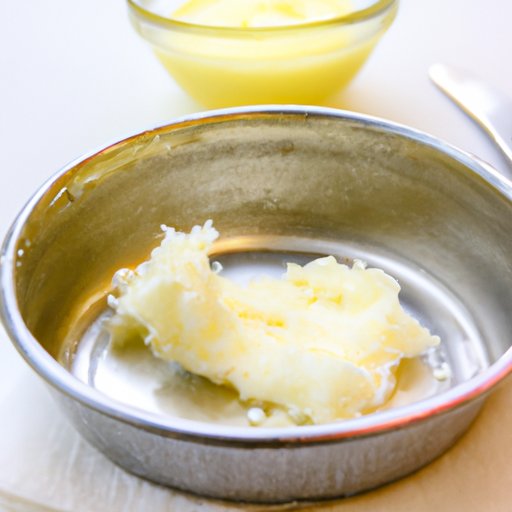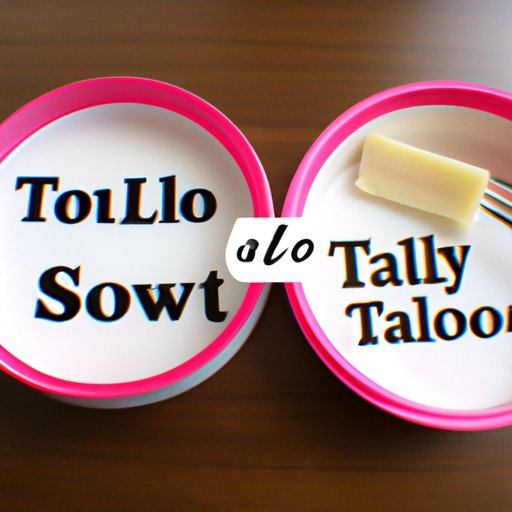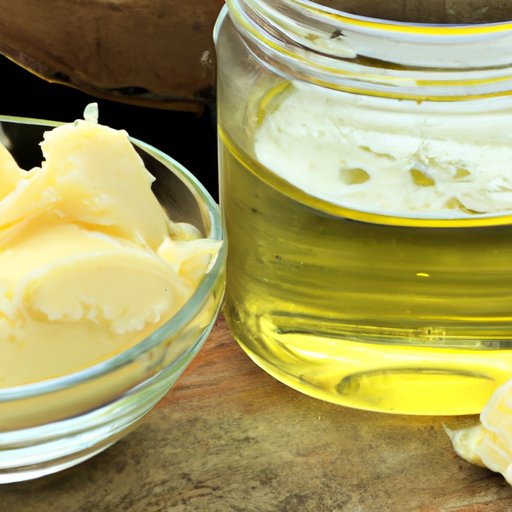Introduction
Tallow is a type of rendered beef fat that has been used in food preparation for centuries. It is a popular cooking oil choice among those who embrace traditional foods and follow low-carb diets. But what exactly is tallow, and is it a healthy choice? In this article, we’ll explore the nutrition, potential health benefits, and possible risks associated with eating tallow.
A Comparison of Tallow vs. Other Cooking Oils: Which is Healthier?
When it comes to choosing cooking oils, there are many options available. From olive and coconut oil to butter and ghee, each has its own unique nutritional profile and culinary uses. So how does tallow stack up against other popular cooking oils? Let’s take a closer look at the nutritional differences between these fats.
Nutritional Profile of Tallow and Other Cooking Oils
Tallow is made from rendered beef fat, which means it is higher in saturated fat than most other cooking oils. According to the United States Department of Agriculture (USDA), one tablespoon (14 grams) of tallow contains 11.9 grams of fat, 9.6 grams of which are saturated. By comparison, the same amount of butter contains 11.5 grams of fat, 7.9 grams of which are saturated. Coconut oil contains 12.8 grams of fat, 11.7 grams of which are saturated. Olive oil, on the other hand, contains 14 grams of fat, 2 grams of which are saturated. While tallow is not the highest in saturated fat content, it is still relatively high compared to other cooking oils.
Benefits of Eating Tallow
In addition to being relatively high in saturated fat, tallow also contains several beneficial fatty acids. One tablespoon (14 grams) of tallow provides 1.3 grams of monounsaturated fat, 0.2 grams of polyunsaturated fat, and 0.1 grams of omega-3 fatty acids. These types of fatty acids have been linked to improved heart health, reduced inflammation, and better brain function. Furthermore, tallow is an excellent source of vitamin K2, which helps to support bone health, and it is also a good source of conjugated linoleic acid (CLA), which may help to reduce body fat and improve muscle mass.

How to Incorporate Tallow into Your Diet for Maximum Health Benefits
Now that you know more about the nutritional profile of tallow, let’s discuss how to incorporate it into your diet for maximum health benefits. Here are some tips for using tallow in recipes and meal ideas.
Recipes and Meal Ideas
Tallow is a versatile cooking fat that can be used in a variety of recipes. It works well for frying, sautéing, baking, and roasting. It can also be used to make sauces, gravies, and other dishes. Some popular recipes that use tallow include fried chicken, stir-fries, roasted vegetables, and beef stew.
Tips on Preparing and Storing Tallow
When preparing and storing tallow, it’s important to keep in mind that it has a relatively low smoke point. This means that it should not be heated to temperatures above 375°F (190°C). To prevent spoilage, it’s best to store tallow in an airtight container in the refrigerator or freezer.

Uncovering the Nutritional Value of Tallow
Now that you know how to incorporate tallow into your diet, let’s take a closer look at its nutritional value. Here’s a breakdown of the macronutrients and micronutrients found in one tablespoon (14 grams) of tallow.
Macronutrients
Tallow is a good source of energy, providing the body with 117 calories per tablespoon. It also contains 11.9 grams of total fat, 9.6 grams of which are saturated. Additionally, it contains no carbohydrates, protein, or fiber.
Micronutrients
Tallow is an excellent source of vitamin K2, providing the body with 10 micrograms per tablespoon. It also contains trace amounts of vitamins A, D, E, and K, as well as calcium, magnesium, phosphorus, and zinc.

Exploring the Pros and Cons of Eating Tallow
Now that you know more about the nutritional value of tallow, let’s explore the pros and cons of eating it. Here’s a breakdown of the potential health benefits and risks associated with consuming this cooking oil.
Potential Health Benefits
Eating tallow may offer several potential health benefits. The fatty acids found in tallow may help to improve heart health, reduce inflammation, and boost brain function. Additionally, the vitamin K2 found in tallow may help to protect against osteoporosis. Finally, tallow is a good source of CLA, which may help to reduce body fat and increase lean muscle mass.
Potential Risks
While tallow does provide several potential health benefits, it is important to note that it is relatively high in saturated fat. Eating too much saturated fat can increase the risk of developing heart disease. Additionally, cooking with tallow at high temperatures can produce toxic compounds, such as heterocyclic amines and polycyclic aromatic hydrocarbons.
Is Tallow a Healthy Choice for Keto Dieters?
The ketogenic, or “keto,” diet is a very popular low-carb, high-fat diet. Tallow is an excellent choice for those following a keto diet, as it is low in carbohydrates and high in healthy fats. However, it’s important to remember that tallow is still relatively high in saturated fat, so it should be consumed in moderation.
Understanding the Keto Diet
The keto diet is a low-carb, high-fat diet. It involves drastically reducing carbohydrate intake and replacing it with fat. When done correctly, the keto diet can lead to weight loss, improved blood sugar control, and other health benefits.
How Tallow Fits In
Tallow is an excellent choice for those following a keto diet, as it is low in carbohydrates and high in healthy fats. Additionally, the vitamin K2 found in tallow may help to support bone health, and the CLA found in tallow may help to reduce body fat and increase lean muscle mass.
What Science Says About the Safety of Eating Tallow
While there is limited research on the safety of eating tallow, several studies have been conducted to evaluate the potential health benefits and risks associated with consuming this cooking oil. Here’s a look at what science says about the safety of eating tallow.
Research Studies
One study published in the journal Lipids found that tallow was effective at lowering levels of low-density lipoprotein (LDL) cholesterol, which is considered the “bad” type of cholesterol. Another study published in the International Journal of Food Sciences and Nutrition found that consuming tallow regularly was associated with a reduction in total cholesterol and LDL cholesterol levels. Finally, a third study published in the American Journal of Clinical Nutrition found that consuming tallow was associated with an increased intake of vitamin K2.
Expert Opinions
Although research studies have shown that tallow may offer several potential health benefits, some experts caution against consuming too much of it due to its high saturated fat content. They recommend limiting intake of saturated fat to no more than 10 percent of daily calories. Additionally, they advise avoiding cooking with tallow at high temperatures, as this can produce toxic compounds.
Conclusion
Tallow is a type of rendered beef fat that has been used for centuries as a cooking oil. It is a popular cooking oil choice among those who embrace traditional foods and follow low-carb diets. In this article, we explored the nutrition, potential health benefits, and possible risks associated with eating tallow. We also discussed how to incorporate tallow into your diet for maximum health benefits and what science says about the safety of eating tallow.
The research suggests that tallow may offer several potential health benefits, including improved heart health, reduced inflammation, and better brain function. Additionally, it is an excellent source of vitamin K2 and a good source of CLA. However, it is important to remember that tallow is relatively high in saturated fat, so it should be consumed in moderation. Additionally, it should never be cooked at high temperatures, as this can produce toxic compounds.
Overall, tallow can be a healthy choice for those looking to add more healthy fats to their diet. However, it is important to be mindful of the potential risks and always practice safe cooking techniques.
(Note: Is this article not meeting your expectations? Do you have knowledge or insights to share? Unlock new opportunities and expand your reach by joining our authors team. Click Registration to join us and share your expertise with our readers.)
